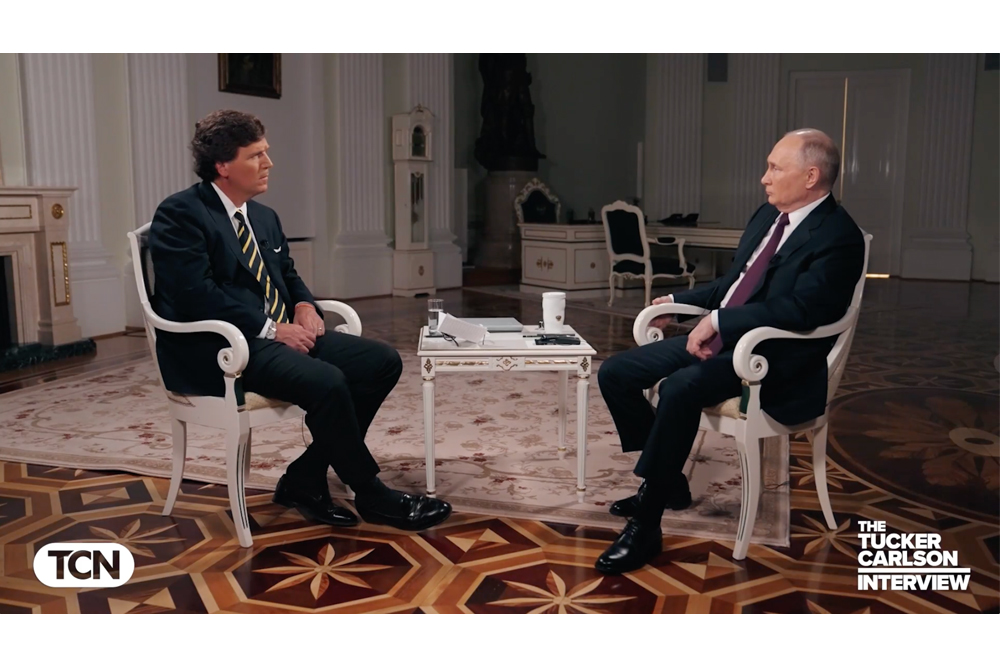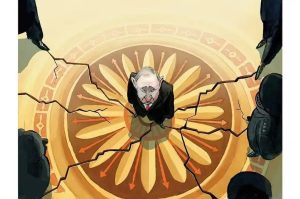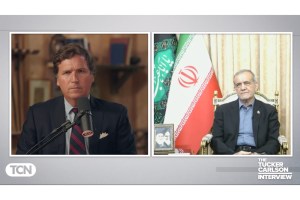Tucker Carlson is a master contortionist.
As conservative strategist David Reaboi reminded us this week, one of the most egregious examples of Carlson’s tendency for reality deformation came in the form of an interview with Kanye West, the troubled rapper who sat for an interview on Carlson’s erstwhile Fox News show a couple of years ago. It was the middle of West’s antisemitic meltdown, but because West was embracing Donald Trump, Carlson presented him as a sensible, even brilliant thinker. “Is West crazy?” Carlson asked at the top of the interview, before concluding at the end: “Not crazy. Worth listening to, even if you disagree with him.”
It would later emerge that Carlson cut West’s craziest comments — which included some hearty antisemitism — from the interview that aired. It didn’t do much to rehabilitate West, who declared on Infowars a few weeks later: “I love Hitler.”
A lack of shame is a defining feature of Carlson’s recent work. Only someone greatly endowed with an inability to feel embarrassed could survive something as brazen as the West fiasco.
But Carlson is a survivor. When he was fired by CNN over a disastrous interview with Jon Stewart, he landed at MSNBC. When he was fired by MSNBC over low ratings, he landed at Fox News. When he was fired by Fox News, he landed on X, where he now commands a huge following of supporters eager to watch the contortionist perform.
This week, Carlson took his circus to Moscow, where he interviewed Vladimir Putin, a well-documented thug whose most recent crime was the unprovoked invasion of Ukraine, an act of pure malice that has so far killed half a million people.
Given this history, the mere thought of an interview between Carlson and Putin sparked military-grade meltdown on social media. Carlson’s more unbalanced critics accused him of treason. His savvier ones noted it wasn’t the mere act of interviewing the autocrat that was cause for controversy, it was that such an interview was being done by Carlson, perhaps the most prominent Putin apologist in America.
The interview did, however, serve as a valuable reminder to us in media business that there might just be some value in old-fashioned television production after all. Carlson spent decades on cable news, where his live interviews were confined to ten-minute segments and his pre-recorded ones chopped down and crammed into an hour-long show pockmarked by MyPillow ads.
Cable news hosts often carp about those constraints, but they would have served Carlson well here. Because the full interview Carlson released on his website and on Elon Musk’s X was received primarily with a yawn. It didn’t help that Putin kicked things off with a twenty-five-minute soliloquy on the Kremlin-friendly history of Russia that started in the year 862, ran through the reign of Prince Yaroslav the Wise, and landed on a curious interpretation of Hitler’s invasion of Poland. Carlson attempted a few times to interject, making appeals for brevity Putin smugly ignored.
Putin trolled his friendly interlocutor throughout their lengthy conversation. At one point, he poked fun at Carlson for his rejection from the CIA after college. When Carlson prompted Putin to more palatable explanations of his invasion, Putin replied with lengthy Kremlin-infused talking points denying Ukraine’s existence as a sovereign country independent of Russia.
Overall, the interview served Carlson’s stated purpose: to beam Putin’s case for his war to American audiences. It served Putin’s purposes too: he repeatedly urged the United States to push Ukraine to the negotiating table, an argument that will surely appeal to Republicans eager to bring an end to American financial support for the war. Putin was more restrained than he sometimes is when speaking to Russian audiences, calmly justifying the invasion with his revanchist history lesson and nonsensical case that Russia is actually on a “denazification” campaign. Carlson maintained a posture of excessive credulity throughout, taking Putin’s claims at face value and sometimes encouraging them. The promotion for Putin came at a pivotal moment for Ukraine; Republicans, having soured on the besieged country, are holding up aid in Congress.
One highlight from the interview was Carlson’s attempt to push Putin on the imprisonment, on bogus espionage charges, of Wall Street Journal reporter Evan Gerskovich. Perhaps inspired by Cockburn’s advice, Carlson asked Putin if he could take Gershkovich home with him. Putin replied that he has “run out” of “gestures of goodwill out of decency.” Carlson repeatedly pressed him, dismissing the farcical claim that the reporter, who has been imprisoned without trial for nearly a year now, committed espionage.
Putin suggested he would be open to a prisoner swap. Carlson pushed back.
“The guy’s obviously not a spy,” Carlson said. “He’s a kid, and maybe he was breaking your law in some way, but he’s not a super spy and everybody knows that. And he’s being held hostage in exchange, which is true with respect. It’s true. And everyone knows it’s true.”
Carlson may have been right when he said, in defense of the interview, that most Americans have little sense of Putin’s motives. That has nothing to do, however, with Putin being denied a platform to share his views, which he has done so repeatedly, starting the day the invasion was launched. Those viewers that made it through Putin’s history lesson would not have learned anything new about Russia’s position on the war.
Ironically, one group of people that will not see Carlson’s truth-spreading interview with Putin are Russians; X remains blocked in Russia.


























Leave a Reply